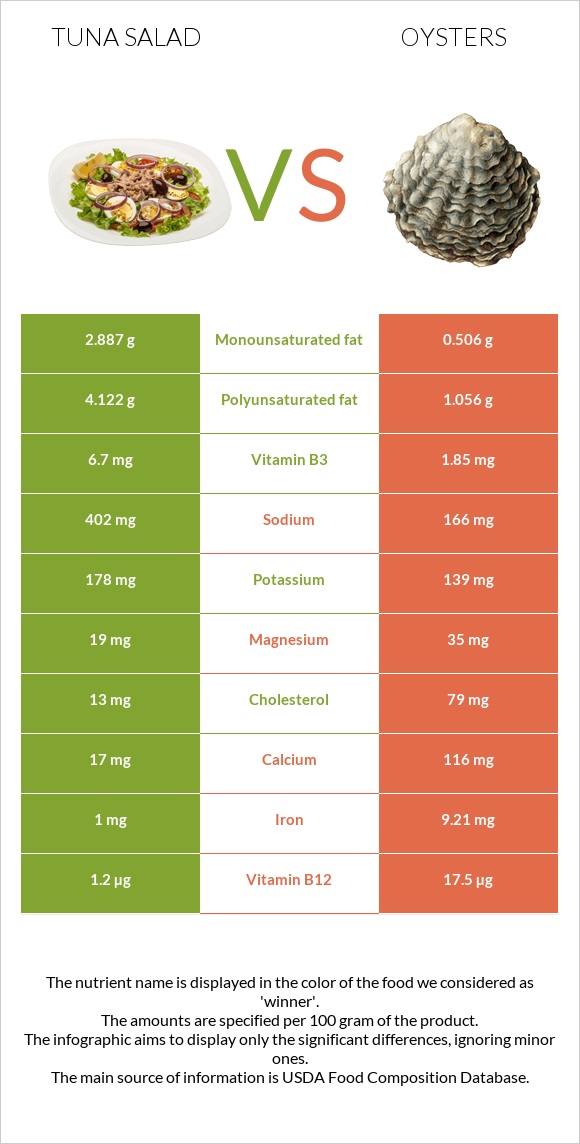Tuna salad vs. Oysters — In-Depth Nutrition Comparison
Compare
What are the differences between tuna salad and oysters?
- Tuna salad is higher in vitamin B3; however, oysters is richer in zinc, vitamin B12, copper, iron, manganese, calcium, and vitamin B2.
- Oysters's daily need coverage for zinc is 709% more.
- Oysters contains 4 times less vitamin B3 than tuna salad. Tuna salad contains 6.7mg of vitamin B3, while oysters contains 1.85mg.
- Oysters has less sodium.
We used Fish, tuna salad and Mollusks, oyster, eastern, wild, cooked, moist heat types in this article.
Infographic

Infographic link
Mineral Comparison
Mineral comparison score is based on the number of minerals by which one or the other food is richer. The "coverage" charts below show how much of the daily needs can be covered by 300 grams of the food.
| Contains more PotassiumPotassium | +28.1% |
| Contains more MagnesiumMagnesium | +84.2% |
| Contains more CalciumCalcium | +582.4% |
| Contains more IronIron | +821% |
| Contains more CopperCopper | +3835.9% |
| Contains more ZincZinc | +13935.7% |
| Contains less SodiumSodium | -58.7% |
| Contains more ManganeseManganese | +1377.5% |
Vitamin Comparison
Vitamin comparison score is based on the number of vitamins by which one or the other food is richer. The "coverage" charts below show how much of the daily needs can be covered by 300 grams of the food.
| Contains more Vitamin CVitamin C | +∞% |
| Contains more Vitamin B3Vitamin B3 | +262.2% |
| Contains more Vitamin B6Vitamin B6 | +32.8% |
| Contains more Vitamin B1Vitamin B1 | +16.1% |
| Contains more Vitamin B2Vitamin B2 | +157.1% |
| Contains more Vitamin B5Vitamin B5 | +71.9% |
| Contains more Vitamin B12Vitamin B12 | +1358.3% |
| Contains more FolateFolate | +75% |
All nutrients comparison - raw data values
| Nutrient |  |
 |
DV% diff. |
| Zinc | 0.56mg | 78.6mg | 709% |
| Vitamin B12 | 1.2µg | 17.5µg | 679% |
| Copper | 0.145mg | 5.707mg | 618% |
| Iron | 1mg | 9.21mg | 103% |
| Vitamin B3 | 6.7mg | 1.85mg | 30% |
| Manganese | 0.04mg | 0.591mg | 24% |
| Choline | 130mg | 24% | |
| Cholesterol | 13mg | 79mg | 22% |
| Polyunsaturated fat | 4.122g | 1.056g | 20% |
| Vitamin E | 1.7mg | 11% | |
| Calcium | 17mg | 116mg | 10% |
| Sodium | 402mg | 166mg | 10% |
| Protein | 16.04g | 11.42g | 9% |
| Fats | 9.26g | 3.42g | 9% |
| Vitamin B2 | 0.07mg | 0.18mg | 8% |
| Monounsaturated fat | 2.887g | 0.506g | 6% |
| Calories | 187kcal | 102kcal | 4% |
| Magnesium | 19mg | 35mg | 4% |
| Vitamin B5 | 0.26mg | 0.447mg | 4% |
| Selenium | 41.2µg | 39.5µg | 3% |
| Saturated fat | 1.544g | 0.948g | 3% |
| Vitamin C | 2.2mg | 0mg | 2% |
| Phosphorus | 178mg | 194mg | 2% |
| Vitamin B6 | 0.081mg | 0.061mg | 2% |
| Vitamin K | 2µg | 2% | |
| Folate | 8µg | 14µg | 2% |
| Carbs | 9.41g | 5.45g | 1% |
| Potassium | 178mg | 139mg | 1% |
| Net carbs | 9.41g | 5.45g | N/A |
| Vitamin D | 2 IU | 0% | |
| Sugar | 1.23g | N/A | |
| Starch | 0.9g | 0% | |
| Vitamin A | 24µg | 26µg | 0% |
| Vitamin B1 | 0.031mg | 0.036mg | 0% |
| Trans fat | 0.068g | N/A | |
| Tryptophan | 0.18mg | 0.138mg | 0% |
| Threonine | 0.701mg | 0.046mg | 0% |
| Isoleucine | 0.739mg | 0.459mg | 0% |
| Leucine | 1.293mg | 0.716mg | 0% |
| Lysine | 1.457mg | 0.762mg | 0% |
| Methionine | 0.47mg | 0.257mg | 0% |
| Phenylalanine | 0.626mg | 0.413mg | 0% |
| Valine | 0.824mg | 0.523mg | 0% |
| Histidine | 0.467mg | 0.22mg | 0% |
| Omega-3 - EPA | 0.014g | 0.353g | N/A |
| Omega-3 - DHA | 0.055g | 0.271g | N/A |
| Omega-3 - ALA | 0.163g | N/A | |
| Omega-3 - DPA | 0.02g | N/A | |
| Omega-3 - Eicosatrienoic acid | 0.004g | N/A | |
| Omega-6 - Gamma-linoleic acid | 0.004g | N/A | |
| Omega-6 - Dihomo-gamma-linoleic acid | 0.007g | N/A | |
| Omega-6 - Eicosadienoic acid | 0.007g | N/A | |
| Omega-6 - Linoleic acid | 0.061g | N/A |
Macronutrient Comparison
Macronutrient breakdown side-by-side comparison
Protein:
16.04 g
Fats:
9.26 g
Carbs:
9.41 g
Water:
63.16 g
Other:
2.13 g
Protein:
11.42 g
Fats:
3.42 g
Carbs:
5.45 g
Water:
78.19 g
Other:
1.52 g
| Contains more ProteinProtein | +40.5% |
| Contains more FatsFats | +170.8% |
| Contains more CarbsCarbs | +72.7% |
| Contains more OtherOther | +40.1% |
| Contains more WaterWater | +23.8% |
Fat Type Comparison
Fat type breakdown side-by-side comparison
Saturated fat:
Sat. Fat
1.544 g
Monounsaturated fat:
Mono. Fat
2.887 g
Polyunsaturated fat:
Poly. Fat
4.122 g
Saturated fat:
Sat. Fat
0.948 g
Monounsaturated fat:
Mono. Fat
0.506 g
Polyunsaturated fat:
Poly. Fat
1.056 g
| Contains more Mono. FatMonounsaturated fat | +470.6% |
| Contains more Poly. FatPolyunsaturated fat | +290.3% |
| Contains less Sat. FatSaturated fat | -38.6% |





